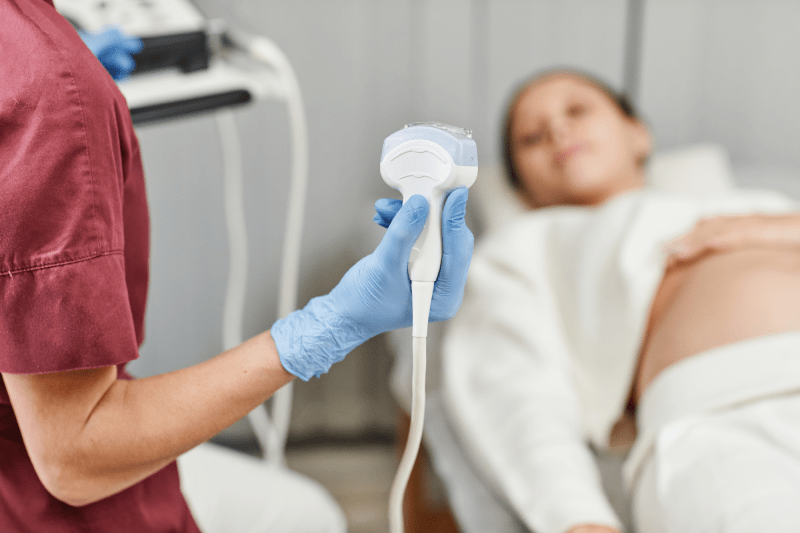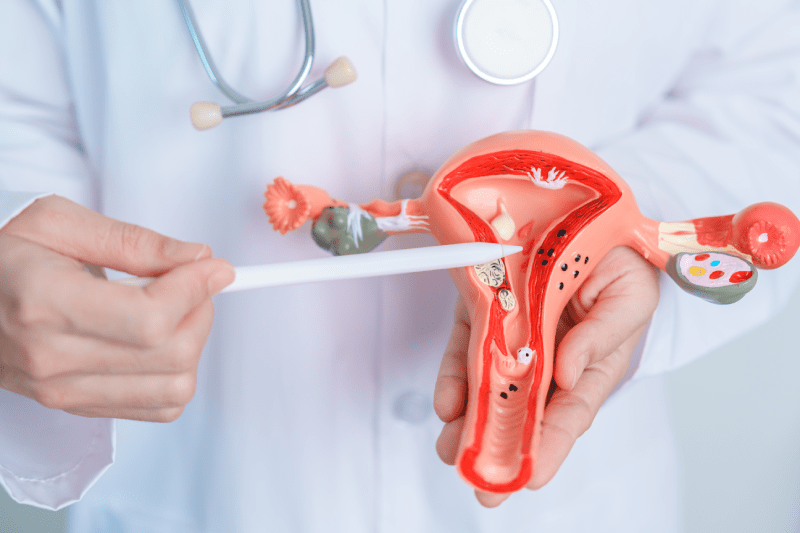Best IVF Centre and IVF Doctor
How Is In Vitro Fertilisation (IVF) Treatment Performed? IVF Process
In vitro fertilization (IVF) is a type of assisted reproductive technology that involves fertilizing the egg outside the body in a laboratory. IVF is generally recommended for couples who are experiencing fertility issues, such as blocked fallopian tubes, low sperm count, or endometriosis. In this article, we will explore how IVF treatment is performed.
- Step 1: Ovarian Stimulation
The first step in the IVF process is ovarian stimulation. This involves the administration of medication to stimulate the ovaries to produce multiple eggs. This increases the chances of fertilization and successful implantation. The medication may be in the form of injections, which are usually self-administered at home with guidance from the fertility clinic.
- Step 2: Egg Retrieval
Once the eggs have matured within the ovaries, they are ready to be retrieved. Egg retrieval is performed under sedation, and a needle is guided through the vaginal wall to the ovaries using ultrasound. The needle is then passed through the follicles, and the eggs are retrieved.
- Step 3: Sperm Collection and Fertilization
On the day of egg retrieval, the male partner will be asked to provide a semen sample. The semen is then washed and prepared in the laboratory. The sperm and eggs are then combined in a Petri dish and placed in an incubator to allow fertilization to occur.
- Step 4: Embryo Culture
Once fertilization has occurred, the resulting embryos are cultured in the laboratory for several days. The embryos are monitored to assess their quality and development. Usually, the best embryos will be selected for transfer to the uterus.
- Step 5: Embryo Transfer
Embryo transfer is a simple procedure that involves inserting a catheter through the cervix and into the uterus. The selected embryo(s) are then transferred to the uterus. The patient may be asked to rest for a short period of time after the procedure to increase the chances of a successful implantation.
- Step 6: Pregnancy Test
Around two weeks after the embryo transfer, the patient will return to the clinic for a pregnancy test. If the test is positive, the patient will be monitored throughout the pregnancy. If the test is negative, the patient may be advised to undergo another cycle of IVF.

How Many Days Does IVF Treatment Take?
The first stage in the IVF treatment process involves ovarian stimulation to produce multiple eggs. This is achieved through the use of fertility medication, which is taken for approximately 8-14 days. During this time, the patient will undergo regular monitoring to ensure the ovaries are responding well to the medication. Monitoring may include blood tests and ultrasounds.
Once the eggs have reached maturity, they are ready for retrieval. Egg retrieval is performed under sedation or general anesthesia and usually takes around 20-30 minutes.
After the eggs are retrieved, they are fertilized with sperm in a laboratory dish. The fertilized eggs (embryos) are then cultured for approximately 3-5 days, during which time they are monitored to ensure they are developing properly.
Once the embryos reach a certain stage of development, usually around day 3-5, they are ready for transfer. This involves inserting a catheter through the cervix and into the uterus, where the embryos are deposited. The procedure is usually quick and painless and takes around 10-15 minutes.
Approximately 2 weeks after the embryo transfer, the patient will undergo a blood test to determine if she is pregnant. If the test is positive, the patient will continue to receive monitoring throughout the pregnancy. If the test is negative, the patient may be advised to undergo another cycle of IVF.
In conclusion, the length of time for IVF treatment can vary depending on several factors, but it usually takes between 2-6 weeks from the start of ovarian stimulation to the pregnancy test.
In Which Cases Is In Vitro Fertilisation Not Possible?
In vitro fertilization (IVF) is a type of assisted reproductive technology that has helped many couples overcome infertility issues and achieve their dreams of starting a family. However, IVF may not always be possible or recommended for certain individuals or couples. In this article, we will discuss some of the cases in which IVF may not be possible.
- Lack of viable eggs or sperm: For successful IVF, both viable eggs and sperm are necessary. If the female partner has no viable eggs or the male partner has no viable sperm, IVF may not be possible. In such cases, donor eggs or sperm may be an option.
- Blocked fallopian tubes: If both fallopian tubes are severely blocked, fertilization cannot occur naturally or through IVF. The eggs can be retrieved through surgical intervention, but this does not guarantee fertilization.
- Uterine abnormalities: If the uterus is abnormal, IVF may not be possible. For example, if the uterus is too small or has adhesions or fibroids, implantation of an embryo may not be feasible.
- Medical conditions: Certain medical conditions, such as severe endometriosis, may make IVF less likely to succeed. IVF may also not be recommended for individuals with a history of certain cancers, genetic disorders, or autoimmune diseases.
- Age: IVF success rates decline as women get older, especially after age 40. Women over the age of 50 are generally not recommended for IVF, as the likelihood of success is very low.
In conclusion, while IVF is a highly effective method for treating infertility, it is not always possible or recommended for everyone. The reasons for IVF not being possible can range from medical conditions to financial constraints. If you are considering IVF treatment, you can message us if you would like to determine if it is a suitable option for you and discuss available alternative treatments with a fertility specialist. Our expert staff will give you all the details about IVF treatment.
What Are The Conditions For IVF?
In vitro fertilization (IVF) is a type of assisted reproductive technology that can help individuals and couples overcome fertility issues and conceive a child. It is a complex process that involves many different steps and requirements. In this article, we will discuss the conditions that must be met for IVF to be a viable option.
- Ovulation: For IVF to be possible, the female partner must be ovulating. This can usually be confirmed through a blood test or ultrasound.
- Sperm count and motility: The male partner must have a sufficient quantity of viable sperm with good motility for fertilization to occur. A semen analysis may be performed to check sperm count and motility.
- Fallopian tube patency: The female partner’s fallopian tubes must be free from blockages to allow the fertilized egg to travel from the ovaries to the uterus for implantation.
- Age: Age can be a determining factor in the success of IVF. Women over the age of 35 generally have lower success rates with IVF, as the quality and quantity of their eggs decline with age.
- Anatomical factors: The female partner’s uterus must be healthy and have no structural abnormalities that would prevent implantation of the fertilized egg.
- Medical conditions: Certain medical conditions, such as endometriosis, polycystic ovary syndrome (PCOS), or uterine fibroids, may affect the chances of success with IVF.
- Emotional and mental health: IVF can be emotionally and mentally challenging. It is important for individuals and couples to have a strong support system in place to cope with the stress and emotional ups and downs that may come with IVF.
In addition to the above conditions, it is also important for individuals and couples to be aware of the financial, physical, and time commitments that come with IVF. IVF can be an expensive and time-consuming process that may require multiple cycles to achieve success.

Which Doctor Should Perform The IVF Procedure?
In vitro fertilization (IVF) is a complex medical procedure that requires a team of healthcare professionals with specialized expertise. The IVF team may include a reproductive endocrinologist, an embryologist, and other healthcare professionals. In this article, we will discuss which doctor should perform the IVF procedure.
The primary doctor responsible for performing the IVF procedure is a reproductive endocrinologist. These specialists have completed specialized training in reproductive endocrinology and infertility diagnosis and treatment. They are experts in the hormonal and biological processes related to the reproductive system, and they have advanced knowledge of fertility treatments such as IVF.
Reproductive endocrinologists work with a team of other healthcare professionals to manage and oversee all aspects of the IVF treatment process. This team may include embryologists, a nurse coordinator, and other support staff. The embryologist is responsible for handling the eggs and sperm in the laboratory and for managing the development and transfer of the embryos.
Before undergoing IVF treatment, patients will typically undergo a comprehensive evaluation to determine the underlying causes of infertility and to determine whether IVF is a viable treatment option. This evaluation may include a physical exam, blood tests, and imaging studies such as an ultrasound. Once the evaluation is complete, a personalized treatment plan will be developed based on the patient’s individual needs and goals.
It is important for patients to choose a reputable and experienced fertility clinic with a team of skilled medical professionals who have a successful track record in performing IVF. Patients should research potential clinics and doctors, as well as read reviews from other patients, to ensure that they receive high-quality care throughout the IVF treatment process.
Is Centre Selection Important in IVF Treatment?
- Experience and Expertise
One of the most important factors to consider when selecting an IVF center is the center’s experience and expertise. It is essential to choose a center that specializes in infertility treatments, and whose medical professionals have extensive experience and expertise in IVF procedures. This will increase the likelihood of success while ensuring that patients receive high-quality, compassionate care.
- Success Rates
Another critical factor to consider when selecting an IVF center is the center’s success rate for IVF. The success rate is the percentage of IVF cycles that result in a successful pregnancy. A high success rate is an indicator of the skill and expertise of the center’s medical professionals and can increase the chances of a successful outcome.
- Facilities and Equipment
The facilities and equipment of an IVF center can significantly impact the success rate of the procedure. It is essential to choose a center that has state-of-the-art facilities and equipment, as this can make a significant difference in the success rates of IVF procedures. The center should have the latest technology, laboratory facilities, and treatment options available to ensure the best possible care for patients.
- Cost
The cost of IVF treatment can vary widely among different IVF centers. It is essential to choose an IVF center that provides a transparent and clear fee structure, including all the charges that are not covered under one fee. It is also advisable to compare the costs of different IVF centers to find the best value for money.
- Location
The location of an IVF center can also be important for patients. Choosing a center that is convenient to access can reduce stress and make the treatment process less overwhelming. Patients may also want to consider the culture and language of the area where the center is located.
In conclusion, selecting the right IVF center is crucial for the success of the procedure. Patients should choose a center that has a proven track record of success, experienced medical professionals, state-of-the-art facilities and equipment, transparent fee structure, and convenient location. This will increase the chances of a successful outcome and ensure that patients receive the best possible care.
Does The State Cover The Costs Of IVF?
The cost of in vitro fertilization (IVF) can be a significant financial burden for many couples. As a result, there is often a great deal of interest in finding out whether the state provides financial assistance or insurance coverage for IVF. The availability of state-funded IVF programs varies depending on the location and the policies of individual states.
Some countries such as Sweden, Belgium, and Israel have established nationalized healthcare systems that cover the cost of IVF for eligible patients. In the United States, public funding for IVF is less common. Only a few states, including Illinois, Massachusetts, and New Jersey, require insurance companies to provide IVF coverage because IVF is not mandated by the federal government as an essential health benefit.
In some cases, states may provide financial assistance for IVF through grant programs or other initiatives. For example, some state governments may provide grants to clinics or organizations that provide fertility-related services to low-income individuals and couples or for those who cannot afford the high cost of treatment. However, it is important to note that these programs are often limited in scope and may not be available in all states.

Best IVF Doctor and Centre – IVF Treatment in Cyprus
In recent years, Cyprus has become an increasingly popular destination for couples seeking in vitro fertilization (IVF) treatment. The country’s advanced medical infrastructure, experienced medical professionals, and supportive legal framework have made it an ideal destination for couples seeking IVF treatment, and several IVF centers and specialists have established practices in Cyprus.
In conclusion, Cyprus is well-established as a premier destination for IVF treatment, with many experienced doctors and top-quality fertility centers to choose from. Couples seeking IVF treatment in Cyprus can choose from a range of highly acclaimed doctors and centers, and can expect world-class care, compassionate support, and the best possible chance of achieving their dreams of starting a family. You can also choose our Cyprus IVF centre for successful IVF treatments. It will be enough to contact us for price and personalised IVF treatments.














Post Comment